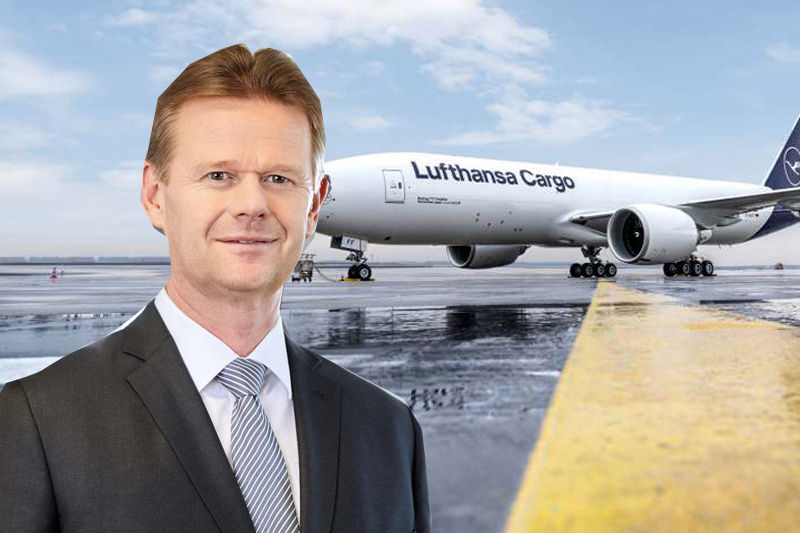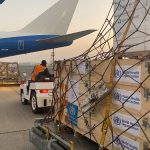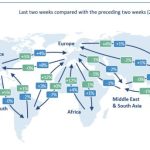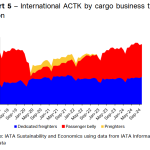Lufthansa Cargo Building A Pragmatic Future
“We will continue to systematically drive digitization along the entire transport chain. We are the first cargo airline in the world to offer our customers completely paperless booking and handling for standard cargo. With our new, fully digital PreCheck process, we will now significantly accelerate and simplify handling processes for our customers. And we will also continue to roll out the eDGD electronic dangerous goods declaration so that even more customers and shippers will be able to benefit from this digital solution.”
Peter Gerber, CEO & Chairman Executive Board Lufthansa Cargo
Frankfurt-based air freight carrier Lufthansa Cargo handled about 8.9 freight-ton- kilometers in 2018 valued at EUR2.7 billion, up by 7 percent compared to 2017, making it still one of the world’s best and biggest in the industry.
And despite political and economic uncertainties in many parts of the world that inevitably affects the movements of goods and the overall throughput of the air cargo industry, Lufthansa Cargo remains optimistic for growth in the horizon with improving economic demographics in emerging markets that require air freight services.
That optimism translates to investments of about EUR400 million to expand the Lufthansa Cargo Center (LCC) with the backing of the Supervisory Board of Deutsche Lufthansa AG, according to Peter Gerber, CEO and Chairman of the Executive Board.
While there is still enough land around Frankfurt Airport for LCC expansion, German engineering and technology would come into play with vertical and modular developments planned for existing facilities.
Construction in Frankfurt is scheduled to begin next year. Once completed in 2024, Lufthansa Cargo is convinced its investments would pay off with the facilities able to offer better capacity yields and quality. In Munich, Lufthansa Cargo is also investing on a new Cool Center
Revenue Growth
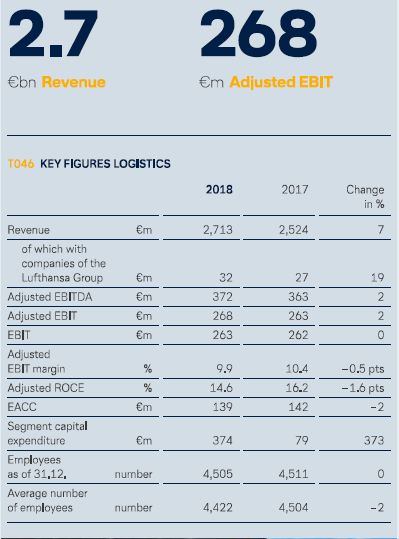 At its annual press event held at the Lufthansa Aviation Center, Gerber pointed out the company’s 2018 profit grew to EUR268 million (adjusted EBIT), the company’s second best result in its history since it was founded on November 30, 1994.
At its annual press event held at the Lufthansa Aviation Center, Gerber pointed out the company’s 2018 profit grew to EUR268 million (adjusted EBIT), the company’s second best result in its history since it was founded on November 30, 1994.
“Our employees have shown full commitment and done an amazing job for our customers. The result gives us additional momentum for new investments in the future,” Gerber pointed out.
Dr. Martin Schmitt, Board Member for Finance and Human Resources who is also Lufthansa Cargo’s CFO, said the profit that the company generated would be used to modernize its means of production and that includes modernizing its fleet and embracing more digitalization.
“We managed to increase our revenue per unit and lower our unit costs last year. We will use the profit to modernize our means of production, which will further enhance our cost efficiency,” said Schmitt.
Digitalization
Gerber said Lufthansa Cargo’s e-AWB penetration has reached 73.9 percent, based on December figures. The company has also introduced the fully automated “Rapid Rate Response” specifically targeting clients seeking immediate bookings or online transactions such as through cargo.one which offers spot pricing tools.
Lufthansa Cargo is also working to fully digitalize its Global Revenue Management, including the “checkin
process” for air freight to speed up the process. Staff’s work places as well as training courses are also planned to be more digitalized to make them more accessible and flexible to people.
“We will continue to systematically drive digitization along the entire transport chain. We are the first cargo airline in the world to offer our customers completely paperless booking and handling for standard cargo. With our
new, fully digital PreCheck process, we will now significantly accelerate and simplify handling processes for our customers. And we will also continue to roll out the eDGD electronic dangerous goods declaration so that even more customers and shippers will be able to benefit from this digital solution,” said Gerber.
Modernizing its fleet
Lufthansa Cargo, which currently has 12 McDonnell-Douglas MD- 11F and 6 Boeing 777F, is moving ahead with its fleet modernization plan.
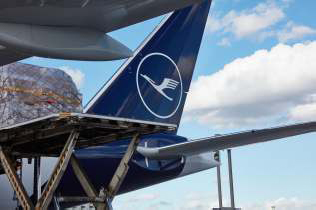 Last month, it received the first of two brand-new B777 that it ordered from Boeing as replacement for 2 MD-11F which it intends to retire. The company’s entire MD-11F fleet will gradually be phased out through 2025.
Last month, it received the first of two brand-new B777 that it ordered from Boeing as replacement for 2 MD-11F which it intends to retire. The company’s entire MD-11F fleet will gradually be phased out through 2025.
The new plane had since been flown to transport cargo between Frankfurt, Beijing and Shanghai. The new Boeing freighters are intended to be generally used for Mexico City, Sao Paulo as well as to Osaka, Chennai, Hyderabad, New
Delhi, Atlanta and Chicago.
The Boeing 777F aircraft are said to be more fuel efficient, tailored for long-haul flights and have more space to haul more cargoes.
“The Boeing 777F is not only the world’s most powerful, efficient and environmentally friendly freighter, it is also a visible sign of our modern-ization strategy,” Gerber said when he announced the acquisition of the planes. “With the
growth of our Boeing 777 freighter fleet, an important milestone has been reached on our way to forming
a company for the next generation.” The Boeing 777F has a full payload capacity of 103 tons and can stay in the air for 10.5 hours covering a distance of over 9,000 km non-stop.
Optimism prevails
The on going trade dispute between the US and China is taking its toll on the global air freight industry, Gerber pointed out. Add to that are the uncertainties that Brexit has created with Britain’s withdrawal from the European Union that creates ambiguities on the movement of goods to and from the country to the European bloc
made of 27 countries.
“So far, we have no clear view on how 2019 will develop,” Gerber told the press emphasizing that it’s hard to predict what lies ahead in the near term due to volatile global situations.
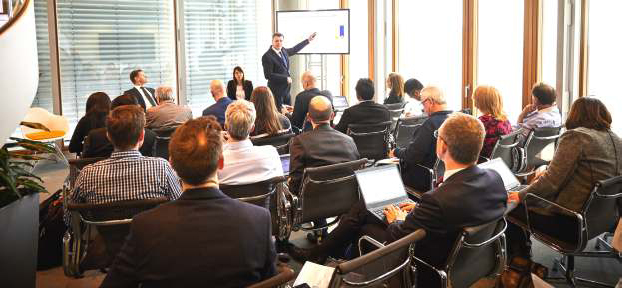 But he noted there are reasons for optimism on the horizon based on presumptive facts such as the growing middle class in many emerging markets that raises people’s income and generating more economic activities in many
But he noted there are reasons for optimism on the horizon based on presumptive facts such as the growing middle class in many emerging markets that raises people’s income and generating more economic activities in many
parts of the world.
“If you ask me, what happens in the next three months, I honestly don’t know. But in the next five years there will be considerable growth,” he said.
According to the nonprofit organization World Data Lab, half of the world’s population is now considered middle class with the rapid growth taking place in Asia. By 2030, their number is projected to grow to 5.3 billion and will have significant and political impact to global trade and economics.
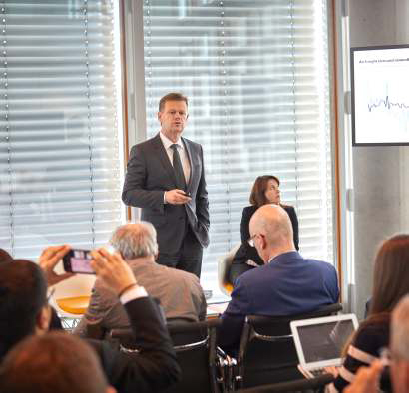 Among the emerging markets that Gerber has high hopes is Africa where its partner, Brussels Airlines Cargo, is fully integrated. “Brussels Airlines Cargo was fully integrated in our company, making us much stronger in Africa,” he said.
Among the emerging markets that Gerber has high hopes is Africa where its partner, Brussels Airlines Cargo, is fully integrated. “Brussels Airlines Cargo was fully integrated in our company, making us much stronger in Africa,” he said.
The Lufthansa Cargo CEO also pointed out the company has also widened its business alliance with other major carriers in Asia and elsewhere such as with ANA Cargo, United Cargo and Cathay Pacific Cargo.
Peter Gerber was born in Gießen on 1 March 1964. After passing his university entrance exams in 1983, he studied law and business management in Gießen and Hagen. In 2008, he additionally completed the Senior Executive Program of Columbia University, New York. Gerber joined Lufthansa in 1992, starting his career in human resources and the law department. His main responsibilities were to develop a new pension scheme and the Miles &
More program. This was followed by various assignments within the Group, including “Programm 15”, Lufthansa’s strategic cost-saving project.
In 1997, he was put in-charge of intercompany transfer pricing, fees and charges with focus on airport and
air traffic control costs, as well as relations with the federal state authorities. From 2001 to 2004, Gerber was responsible for and directed the Group-wide “D-Check” program, which aimed to consolidate corporate earnings.
From June 2003 to August 2011, Gerber was the Lufthansa spokesman for the “Air Transport Initiative for
Germany”. In addition, he had responsibility for strategic corporate development in 2004.
From December 2004 to May 2009, Gerber was in charge of corporate industrial relations and social security
within the Lufthansa Group. In June 2009, he was appointed to the Executive Board of Lufthansa Cargo AG with responsibility for Finance and Human Resources.
In June 2012, Gerber switched to the Executive Board of Lufthansa Passage Airlines, where he was responsible for the Human Resources, IT & Services division. He has been the Chairman of the Executive Board and CEO of Lufthansa Cargo AG since May 2014.
Gerber is also Chairman of the Super visor y Board of Albatros Versicherungsdienste GmbH and holds a seat on the Supervisory Board of Fraport AG. He is married with two children.







